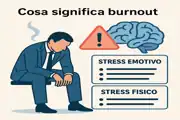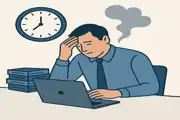
What does burnout mean? It's a critical personal condition, both psychologically and physically. These emotional breakdowns, or rather, breakdowns, have increased during the pandemic and the period of smart working. Let's start with the assumption that the pandemic has significantly forced us to change our lifestyle, work, and professional habits.
For everyone who could afford it, the need arose to change their work habits, so the term smart working has gradually entered the minds of these people over time. We're talking about a working approach that's completely different from the traditional one. However, the emotional impact that a working practice tends to have on the individual shouldn't be underestimated.
Let's start with a premise: smart working isn't a perfect way of working, ideal for everyone. So, while everything seemed perfect, almost idyllic, in the initial phase, it has proven to be difficult to manage, especially from a psychological standpoint. Because if smart working isn't managed appropriately, especially in terms of working hours, it can certainly lead to a kind of physical and psychological exhaustion.
If we were to translate the term "burnout" from English to Italian, what specifically would it refer to? If we were to give it its literal meaning, we would speak of "exploded," "exhausted."
This terminology also has a history, dating back to the 1970s, when it was first associated with healthcare professions that placed a high level of stress and psychological pressure on the individual.
Then it was associated with a whole range of healthcare professions and beyond, where the most important factor was, in effect, contact with people and the ability to help them. Let's look at this list of professions with a highly stressful load from a psychological perspective:
We're talking about people who work as nurses;
We're talking about people who work as doctors;
We're talking about people who work as teachers;
We're talking about people who work as social workers;
We're talking about people who work as law enforcement officers, such as police officers.
In the past, these specific professions were identified as having a high level of stress and were prone to leading an individual to a state of exhaustion, both physical and psychological.
However, over time, things have changed; today, this term is no longer associated with medical professions, where the stress level is very high, but is used for all jobs involving conditions of great psychological pressure and related physical stress.
Precisely in this sense, the World Health Organization (WHO) in 2019 provided a specific definition of this mental and physical problem, defining it as a job-related condition where stress is not adequately or optimally managed. However, burnout has become associated with stress that persists over time.
It is important to note, however, that the word "stress" does not necessarily have to be associated with a negative condition. Under normal conditions, it is a physiological state that leads a person to utilize personal resources—emotional, mental, and physical—to optimally resolve a problem or suboptimal work situation.
However, just as we can find a positive side to situations, there is also an inevitable negative side associated with excessively prolonged stress. This leads the individual to exhaust that mental reserve of both physical and psychological energy that as such allows one to manage a problem, a criticality that has emerged in a completely optimal way.
Thus, an initial positive situation, dictated by an effective response from an individual who finds himself promptly and attentively managing a difficult situation, then becomes a situation that leads the individual to progressively deplete the resources he had initially deployed, to the point of having none at all, leaving him feeling tired, demotivated, and physically and psychologically drained.
What causes a problem like burnout? Essentially, it's a severe imbalance that has developed within the individual. On the one hand, there's the workload and related stress, and on the other, the resources deployed by the individual are completely disproportionate to what they actually have to do, causing progressive exhaustion.
Regarding this condition in the context of smart working, we can identify two specific and fundamental factors that allow us to understand the critical issues the worker may face:
Inability to switch off from work;
Not being able to organize work with precise times.
So what exactly is happening? What happens is that the worker is unable to properly organize their workspace, balancing work with extracurricular activities that allow them to relax. In practice, the worker is always "on the job," never able to unwind and relax. This psychological overload tends to progressively deplete the worker's mental and physical health over time.
Can objective risk factors be identified that put a worker at risk of developing this syndrome? Yes, let's see what they are:
It could be factors related to economic status, lifestyle, or family support;
It could be due to factors related to the type of work. A person who performs a job with a high level of human interaction is more at risk. Think of teachers or hospital workers.
There could be organizational factors such as heavy workloads or bureaucracy.
Are there specific symptoms that shouldn't be underestimated but taken very seriously? Yes, let's see what the symptoms are:
The individual may suffer from insomnia;
The individual may suffer from headaches;
The individual may have stomach pain;
They may have difficulty regaining lost energy between shifts;
Over time, the individual reaches a sort of physical and mental exhaustion;
They begin to feel less interested in their work;
They experience a sense of personal inadequacy.
A smart worker may experience specific phases before feeling overwhelmed. The first phase involves enthusiasm for their work; in the second phase, they work but realize they're no longer motivated; in the third, they begin to doubt the quality of their work; and in the fourth, there's a sort of complete disinterest in their work.
Now that we've seen what burnout means, it's important to establish some rules, such as:
Establish specific work hours;
Set reasonable goals;
Go outside to recharge your batteries and regain mental peace;
Engage in passions and hobbies to relax.
If all this doesn't work and the individual realizes they're experiencing significant personal difficulties, it's a good idea to consult a psychologist or psychotherapist.
